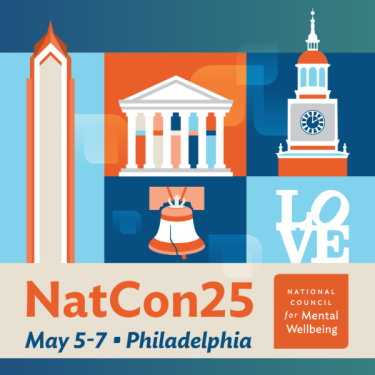FOR IMMEDIATE RELEASE
CONTACT
Sophia Majlessi
SophiaM@TheNationalCouncil.org
(202) 621-1631
Behavioral Health-based Report Recommends Communitywide Response to Mass Violence
WASHINGTON, D.C. (August 6, 2019) – Today, the Medical Director Institute (MDI) of the National Council for Mental Wellbeing released, “Mass Violence in America: Causes, Impacts and Solutions,” a comprehensive response following recent episodes of mass violence in El Paso, Texas; Dayton, Ohio and Gilroy, California. For the first time, this groundbreaking report examines the reasons, contributing factors and actionable solutions surrounding mass violence in America through the lens of behavioral health.
In the wake of these extraordinary tragedies, policymakers and the public are quick to raise the specter of mental illness as a major contributing factor. According to the report, “people with serious mental illness are responsible for less than 4 percent of all violence and less than one-third of mass violence.” Statistics bear out that most people who commit mass violence do not have a serious mental illness.
To dispel misconceptions and uncover the real issues surrounding mass violence, MDI convened a diverse panel of experts, including clinicians who treat individuals with mental illnesses and substance use disorders, administrators, policymakers, researchers, educators, advocates, law enforcement personnel, judges, FBI personnel and parents to conduct an evidence-based analysis of mass violence.
The report examines existing data and expertise on mass violence and makes recommendations, including:
- Creation of threat assessment teams with members from human resources, law enforcement, legal teams, security departments and behavioral health clinicians.
- Enactment of state extreme-risk protection orders (also known as red flag laws) that allow for the temporary removal of guns from individuals who are known to pose a high risk of harming others or themselves in the near future.
- Involve mental health professionals in threat assessments conducted by law enforcement and implementation of red flag laws.
- The requirement of training on violence risk assessment for all clinicians.
- Training staff within schools, law enforcement and communities with high-risk groups in Mental Health First Aid, which teaches skills to respond to the signs of mental and substance use disorders.
- Reexamination of the effectiveness of zero-tolerance policies and security measures like bulletproof glass and metal detectors in schools.
“Mass violence is a communitywide problem that demands a communitywide solution,” said Joe Parks, M.D., co-chair of the Medical Director Institute. “While there is no single solution to mass violence, the report outlines a multifaceted community response that is required for addressing this large-scale and growing national issue.”
Chuck Ingoglia, president and CEO of the National Council for Mental Wellbeing, said with the release of this report, inaction on mass violence is no longer an option. “For many law enforcement officers, clinicians, teachers and others, a lack of knowledge has prevented them from developing a coordinated plan to prevent mass violence. Previously, we have done our best to prepare for the aftermath. With this comprehensive plan, we finally have a roadmap to preventing and reducing it.”
Reducing the frequency of mass violence does not lie with one group or entity; it requires cooperation among multiple national systems and institutions, including the health care, law enforcement, judicial, correctional and school systems, as well as government and community leaders and officials.
The expert panel was led by: Donald Bechtold, M.D., DLFAPA, FAACAP, chief medical officer, Jefferson Center for Mental Health; Sara Coffey, D.O., Assistant Professor of Psychiatry and Behavioral Sciences, Oklahoma State University; Jeffrey Lieberman, M.D., chair, Department of Psychiatry, Columbia University; and Frank Shelp, M.D., MPH, medical director, Envolve.
###
Methodology
The Medical Director Institute brought together a diverse group of practitioners, administrators, policymakers, researchers, educators, advocates, payers, patients and family members to ensure a discussion from a variety of viewpoints. Each provided literature and research from their area of expertise. A technical writer and co-editors recorded the proceedings and provided additional context from outside literature and sources. The recommendations contained in the report are concrete, specific and actionable. The executive summary can be accessed here.
About the Medical Director Institute
The Medical Director Institute advises the National Council for Mental Wellbeing board, staff and membership on issues and topics heavily impacted by clinical practice and provide longer-term guidance through a series of technical papers. The Medical Director Institute is primarily composed of medical directors from National Council member organizations. The full roster can be found at www.thenationalcouncil.org/about/national-mental-health-association/medical-director-institute.
About The National Council
Founded in 1969, the National Council for Mental Wellbeing is a membership organization that drives policy and social change on behalf of over 3,200 mental health and substance use treatment organizations and the more than 15 million children, adults and families they serve. We advocate for policies to ensure access to high-quality services. We build the capacity of mental health and substance use treatment organizations. And we promote greater understanding of mental wellbeing as a core component of comprehensive health and health care. Through our Mental Health First Aid (MHFA) program, we have trained more than 4 million people in the U.S. to identify, understand and respond to signs and symptoms of mental health and substance use challenges.



